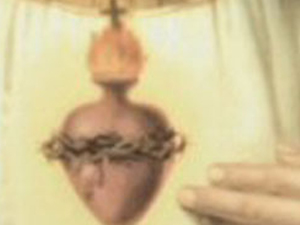 A non-Catholic acquaintance was visiting my home recently. On seeing one of the Sacred Heart pictures in the house, she commented that that one of her older relatives was an Italian Catholic and liked those “Sacred Heart pictures too, but really, I think they are pretty morbid.”
A non-Catholic acquaintance was visiting my home recently. On seeing one of the Sacred Heart pictures in the house, she commented that that one of her older relatives was an Italian Catholic and liked those “Sacred Heart pictures too, but really, I think they are pretty morbid.”
“Oh, my dear,” I thought, “it would take hours….”
But here is the Reader’s Digest version.
Judas betrayed Jesus with a kiss. Judas, about whom the Lord said, “It would be better for that man if he had not been born.” God cannot be betrayed, for to be betrayed one must trust, one must enter into friendship, relating to and opening oneself to another, putting one’s heart at risk.
God cannot be betrayed for, in His divinity, He has complete foreknowledge of all things and complete knowledge of all events. Nothing can surprise Him. As one preacher once put it, “Has it ever occurred to you that nothing has ever occurred to God?” God can be rebelled against; but God cannot be betrayed.
But Jesus was betrayed. Jesus could be betrayed because he could love with a human heart, a heart that could be given to another in human friendship. When the Second Person of the Holy Trinity assumed to Himself human nature He made Himself vulnerable to the deep hurt of betrayal.
As His forefather David so poetically and prophetically expressed it when his friend Ahithophel conspired with Absalom to wrest the kingship from David:
My heart is in anguish within me, the terrors of death have fallen upon me. Fear and trembling come upon me, and horror overwhelms me. And I say, “O that I had wings like a dove! I would fly away and be at rest; yea, I would wander afar, I would lodge in the wilderness….” It is not an enemy who taunts me — then I could bear it; it is not an adversary who deals insolently with me — then I could hide from him. But it is you, my equal, my companion, my familiar friend. We used to hold sweet converse together; within God’s house we walked in fellowship…. My companion stretched out his hand against his friends, he violated his covenant…. His speech was smoother than butter, yet war was in his heart; his words were softer than oil, yet they were drawn swords (Psalm 55).
“But it is you.” You, the one not suspected. You, the one I trusted. You, my friend. Here is the cry of every betrayed heart through all of human history.
Jesus is both God, who mysteriously choose Judas in some way we do not understand, to be the instrument of His own human death, yet without any violation of Judas’ own free will — and man. A man who gave His genuine, loving, trusting friendship to Judas and was betrayed. Whose human emotions did what every human’s do in such an event: go over the good times, search them, probe them for missed clues, question the reality of them. Ask, “What did I do? Why did he do this to me? How could he… when I loved him so…?”
Because that is the point of the Sacred Heart: that Jesus was betrayed and really hurt by that betrayal, as any of us are hurt when we are betrayed — because he really loved Judas. That God — the eternal, omnipotent, God — has a human heart. A heart stabbed by Judas’ betrayal and Peter’s denial, as really pierced by a lance. A heart pained by our sin, yet still aflame with love for us.
We Catholics love the image of the Sacred Heart because it helps us to ponder the Incarnation and God’s love.
Nothing morbid about that!
(© 2011 Mary Kochan)



